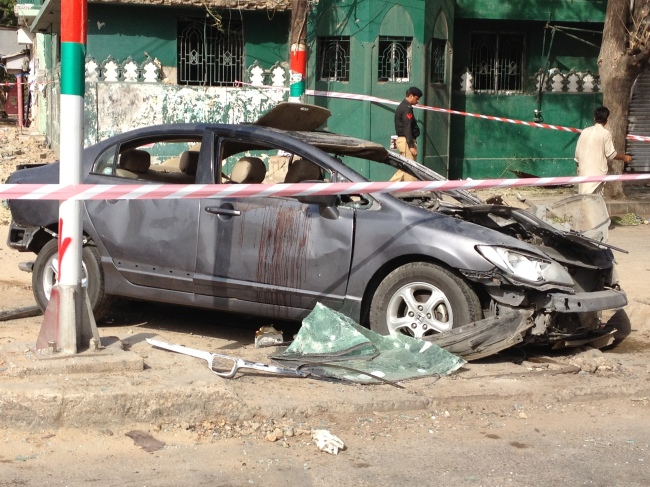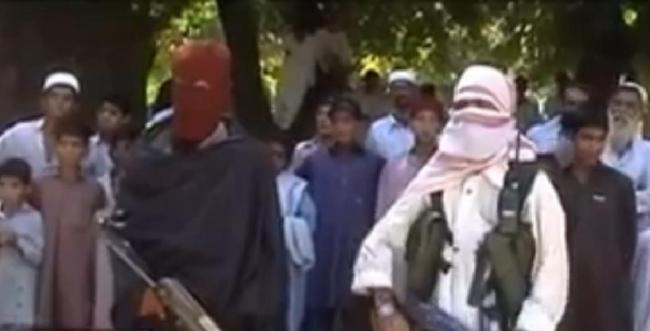
On the shiny morning of 26th June 2013 in Karachi (Pakistan) around 08:10am, the sudden and severe explosion shook the Karachi and Judiciary. Will this attack take judiciary on back foot in convicting terrorists?
“At the blast side two vehicles were totally damaged, one was the police escort which was flipped on the road and the other vehicle was smashed with the footpath. The blood was spattered everywhere on the road and many policeman were critically injured laying on the road. The smoke and sirens dominated the area in few minutes but who was attacked and why?” Jameel Ahmed, the resident nearby said.
After some time, revelation had been made by news media that, Senior Judge of the Sindh High Court Mr. Maqbool Baqar has been attacked by the banned outfit. The responsibility of attack was acknowledged by Tehreek-e-Taliban Pakistan (TTP).
Suddenly, the provincial administration, Judges of the high court and law enforcement agencies were become active after the incident and started holding meetings regarding this attack. Meanwhile, Justice Maqbool Baqar's profile was given by High Court website.
The question arises here is why Justice Baqar was the victim of attack by the TTP and Lashkar-e-Jhangvi (LeJ)? And would Judiciary be on back foot after this attack?
On condition of anonymity of name due to sensitivity of the case, high ranked officer in Police department said that, “ In 28th December 2009, Ashora rally has been attacked and in result of that attack people from Shia sect stormed and flamed the shopping market nearby the blast place which resulted loss of millions worth of property of small business individuals”. (Note: Ashora : Shia sect in Islam convened religious rally on 09th and 10th in Muhram Ul Haram to mourn on the martyrdom of Hazrat Imam Hassan and Hazrat Imam Hussain , as per Islamic Calender)
Police Source added, “Police caught culprits with the help of close circuit cameras and presented before Justice Maqbool Baqar who was administrative Judge (Who deals with initial stages of the case till proceedings by trial court) at that time. Unfortunately, the result of close circuit cameras proved the benefit of doubt for culprits and Justice Maqbool Baqar acquitted almost all those suspicious people who were arrested by us (Police)”.
Police source further mentioned, “After some time, highly wanted target killer Muntazir Imam got arrested by Crime Investigation Department (CID). Law enforcement agency hold Muntazir Imam under its custody for longer than prescribed in law. Justice Maqbool Baqar was the Administrative Judge and He took notice of prolonged arrest of Muntazir Imam and sent him to medical. This lenient act of Justice Baqar made his persona suspicion or pro Shia before banned outfit, Lashkar-e-Jhangwi (Anti-Shia militant group) and Tehreek-e-Taliban Pakistan (TTP).”
The Sunni and Shia are two largely populated sects in Islam. Generally, both sects have different way of life to live. The Sunnis believe in the Ijmah of the companions (Khalifas after Prophet Muhammad P.B.U.H). The Shias believe in the primacy of succession through Ahl e Bait (Family of the P.B.U.H). The former resulted in the institution of Khilafat, the latter in the evolution of Imamat and Wilayat. And the feud has continued long after either institution has ceased to have relevance to the contemporary world.
These differences were contained during the Khilafat of Abu Bakr (r) and Omar (r) but burst into the open with the assassination of Uthman (r). The ensuing civil wars were inconclusive and ended only after the assassination of Ali (r) and the abdication of Hassan (r) in favor of Amir Muawiya. The conversion of the Khilafat into a dynasty brought on the tragedy of Karbala, which is a benchmark in Islamic historiography.
On the anonymity of identification and name, CID official informed that, “ In December 2012, law enforcement agencies arrested two suspects who were planning to attack Justice Maqbool Bakar. Since then Justice Maqbool Baqar started using private vehicle and only law enforcement knew about his moments”.
“The security escort used same route seven days till this attack happened, this is against keeping standard VIP security. Most importantly, Justice Maqbool Baqar used to reach office after 9:00 am but on the day he came early and terrorists knew that he will be coming early. Terrorists also knew that, the security cameras in that red zone are out of order”. CID source mentioned.
CID source further mentioned. “Inspector General of Sindh police and Deputy Inspector General Police of South region has made teams separately to probe into this attack but both teams are doing nothing except holding formal meetings”.
“This attack planned and executed by Lashkar-e-Jhangvi (Banned outfit and working closely with TTP) on the instruction of TTP. The instructions of this attack was given by Jehadis via phone who were in Central Jail of Karachi. We raided Central Jail Karachi with Rangers and found the cell phones and laptop there which are under examination. We investigated some suspects and came to know that more Judges of High court and District courts are under threat and these kinds of attacks in future could be inevitable. Judges are threatened and this could possibility affect their professional work. Right now, there are twenty judges are working in a Sindh High court and only thirteen of them are having police escorts, rest of the seven judges are having just one guard each and are totally exposed to terrorist attacks”. CID source said.
CID Source concluded by saying that, “Though, we tried to catch Hafiz Bashir Leghari who was the mastermind of the attack on Justice Baqar but he got killed in the encounter still we have three high valued suspects who are underground but possibility are still in Karachi. Their names are, Munna Bihari, Nasir and Qayoom are active members of Lashkar-e-Jhangvi and are residents of Orangi town.
Chairperson Human Rights Commission of Pakistan (HRCP) Zohra Yousuf have told stated, “Judges are human and they can be afraid under any threat, it’s a responsibility of the government to provide them security. If these kinds of attack on judiciary will continue then we will have to forget fair trials in any court”
“Militancy and terrorism has increased so much that now Judges are becoming afraid to rule against culprits which is very dangerous sign for our society” Miss.Yousuf added.
Former Chief Justice of Pakistan, Mr. Justice (R ) Syed Uz Zaman Siddiqui said, “Judges always have many pressures during proceeding of any trail and they are enduring it well. The attack on Justice Baqar was event but it won't affect professionalism of the rest of the Judges”.
“Judges should be given standard security at all level. The judges of lower courts are more vulnerable to any such attack then high court Judges”. Mr. Siddiqui added.
Information minister Sindh, Mr. Sharjeel Memon already stated in his statement that, “Judiciary is too afraid to convict culprits”. If this is true then not only Pakistan but its allies of war in terror will be in trouble.
Special Advisor to Chief Minister Sindh, Mr. Jam Kaim mentioned, “The moral of judiciary is still high and we will do our best to protect the other judges” He further said, “The government of Sindh has made sure that security and law enforcement agencies should take all measurements to stop high value killings by militants. We are at war with those who try to challenge the writ of the government and we will surely take all measurements to protect not only Judges and Politicians but also common man as well”.

